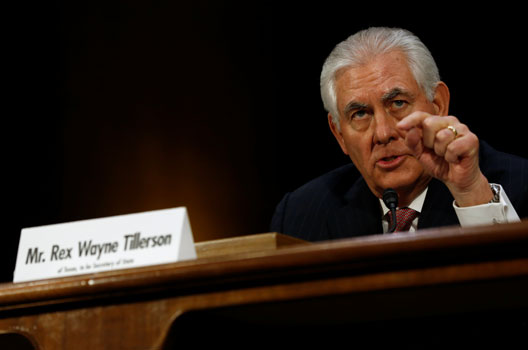 US Secretary of State Rex Tillerson’s current trip to the Middle East reportedly seeks to attempt to restore stability in the region following the virtual destruction of the Islamic State of Iraq and al-Sham (ISIS) by US and coalition forces. What is his way forward with the Turks and how should Washington manage its differences with Ankara on Syria?
US Secretary of State Rex Tillerson’s current trip to the Middle East reportedly seeks to attempt to restore stability in the region following the virtual destruction of the Islamic State of Iraq and al-Sham (ISIS) by US and coalition forces. What is his way forward with the Turks and how should Washington manage its differences with Ankara on Syria?
Given the raft of other problems in the relationship—the fate of the Turkish cleric Fethullah Gülen, the detention of American Consulate staff in Adana and Istanbul, disagreement about the US recognition of Jerusalem as Israel’s capital, Ankara’s dalliance with Moscow and Tehran, and the difficulty of dealing with an increasingly authoritarian and erratic ally—how much can Tillerson actually achieve?
While these problems are serious, Syria is the one that threatens to tear the alliance apart. It clearly is high on Washington’s priority list; no one wants hard-won victory against ISIS to come undone.
For Ankara, the Syrian endgame and strategies to foster stability there are no less important. Indeed, Syria looks like an existential problem—and what’s on offer unfriendly: Bashar al-Assad likely to remain in power and in a position to reassert authority throughout the country—slowly, but violently; Syrian Kurdish political forces hostile to Turkey (and to many Syrian Arabs) in control of most of the border region; a 3.5 million Syrian refugee population that will not likely go home and millions more poised to cross into Turkey precisely because of Assad and the Syrian Kurds; and Russia (and Iran) sometimes helpful, but duplicitous, as well.
On his trip, Tillerson will get an earful in Ankara about American perfidy on Syria. Officials there never liked the Obama administration’s decision to focus exclusively on ISIS without clear aims for what would come after it in Syria—Assad or otherwise. They liked even less America’s link-up against ISIS with Kurdistan Workers’ Party (PKK)-allied Syrian Kurdish People’s Defense Forces (YPG), the core of a nominally broader Syrian Democratic Force we created to confront ISIS on the ground, despite that effort’s success. And they have been furious over recently announced Pentagon plans to arm the YPG and other elements for the long term in northern Syria, which strengthens a hostile force on Turkey’s border and would seem likely to undermine stated US goals of unity for the country. An American strategy that has seemed antithetical to Turkey’s interests and not particularly effective in bringing long-term stability to Syria was a manageable problem bilaterally in 2016 and 2017, but it threatens irreconcilability as the Syrian endgame unfolds today.
Leaving aside differing narratives, three realities seem evident: no long-term US strategy in Syria is likely to succeed without Turkish buy-in; Ankara must have support from Washington to secure itself from Syria-related insecurities; and the Syrian Kurds are not going anywhere. To the extent that the Trump administration wishes to foster stability in Syria, it has to find ways to reconcile these issues. Doing so will not solve other problems in US-Turkish relations, but will change the climate in ways that should make addressing them less contentious.
So, the conversation Tillerson needs to have in Ankara ought to focus on the long term in Syria: what will be achievable over the long haul, what forces and factors can be mobilized to bring about a more stable and secure Syria—and what actions or issues detract from that, how should the problem of Assad be managed, and what should be Washington’s and Ankara’s expectations of each other.
Just as Turkish leaders have tough questions for their American guest, so the US secretary of state must be tough, as allies should be tough, on how competing priorities, realities, interests, and needs can be reconciled, including in light of other bilateral tensions.
Tillerson should also consider taking a provocative line—with the Turks and with his own colleagues at home, especially in the military—on the matter of the Syrian Kurds. America’s baggage with the YPG may now be such that abandonment no longer seems possible, but ways do exist and are worth exploring to leverage the relationship into solutions that respect Turkey’s security needs and put its relations with Syrian Kurdish leaders on a better trajectory. Indeed, over the longer term, the Syrian Kurds and Turkey have no choice but to accommodate one another.
Tillerson’s visit to Turkey comes at a momentous time. The future of US-Turkish relations depends on it—and on the Turks’ welcoming reception of him. New ideas for sorting out the conundrums in Syria and managing broader bilateral tensions and problems will not wipe difficulties away, but can help lead Ankara and Washington toward better and more productive paths—or at least away from destructive ones.
Ross Wilson is a distinguished senior fellow in the Atlantic Council’s Eurasia Center. He served as the US ambassador to Turkey from 2005 to 2008.
Image: Rex Tillerson, the former chairman and chief executive officer of Exxon Mobil, testifies before a Senate Foreign Relations Committee confirmation hearing on his nomination to be US secretary of state in Washington, US. January 11, 2017. (Reuters/Jonathan Ernst)

